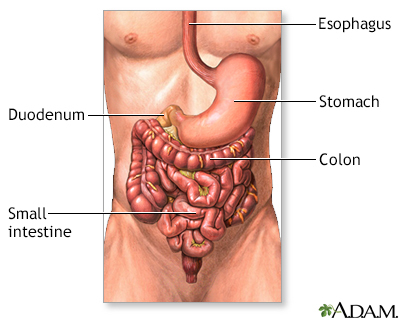Tenesmus
Definition
Tenesmus is the feeling that you need to pass stools, even though your bowels are already empty. It may involve straining, pain, and cramping.
Alternative Names
Pain - passing stool; Painful stools; Difficulty passing stool
Considerations
Tenesmus most often occurs with inflammatory diseases of the bowels. These diseases may be caused by an infection or other conditions.
It can also occur with diseases that affect the normal movements of the intestines. These diseases are known as motility disorders.
People with tenesmus may push very hard (strain) to try to empty their bowels. However, they will only pass a small amount of stool.
Causes
The condition may be caused by:
- Anorectal abscess
- Colorectal cancer or tumors
- Crohn disease
- Infection of the colon (infectious colitis)
- Inflammation of the colon or rectum from radiation (radiation proctitis or colitis)
- Inflammatory bowel disease (IBD)
- Movement (motility) disorder of the intestines
- Ulcerative colitis or ulcerative proctitis
Home Care
Increasing the amount of fiber and fluid in your diet can help ease constipation.
When to Contact a Medical Professional
Contact your health care provider if you continue to have tenesmus.
Also contact your provider if you have:
- Abdominal pain
- Blood in the stool
- Chills
- Fever
- Nausea
- Vomiting
These symptoms could be a sign of a disease that might be causing the problem.
What to Expect at Your Office Visit
The provider will examine you and ask questions such as:
- When did this problem occur? Have you had it before?
- What symptoms are you having?
- Have you eaten any raw, new, or unfamiliar foods? Have you eaten at a picnic or large gathering?
- Do any others in your household have similar problems?
- What other health problems do you have or have had in the past?
The physical exam may include a detailed abdominal exam. A rectal exam is performed in most cases.
Tests that may be done include:
- Colonoscopy to look at the colon and rectum
- Complete blood count (CBC)
- CT scan of the abdomen (in rare cases)
- Proctosigmoidoscopy (an examination of the lower bowel)
- Stool cultures
- X-rays of the abdomen
Gallery

References
Kuemmerle JF. Inflammatory and anatomic diseases of the intestine, peritoneum, mesentery, and omentum. In: Goldman L, Schafer AI, eds. Goldman-Cecil Medicine. 26th ed. Philadelphia, PA: Elsevier; 2020:chap 133.
Quick CRG, Biers SM, Arulampalam THA. Nonacute abdominal pain and other abdominal symptoms and signs. In: Quick CRG, Biers SM, Arulampalam THA, eds. Essential Surgery Problems, Diagnosis and Management. 6th ed. Philadelphia, PA: Elsevier; 2020:chap 18.
Tanksley JP, Willett CG, Czito BG, Palta M. Acute and chronic gastrointestinal side effects of radiation therapy. In: Feldman M, Friedman LS, Brandt LJ, eds. Sleisenger and Fordtran's Gastrointestinal and Liver Disease. 11th ed. Philadelphia, PA: Elsevier; 2021:chap 41.